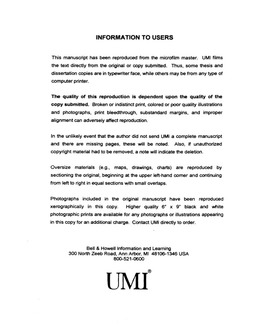| dc.contributor.advisor | Kaid, Lynda Lee, | en_US |
| dc.contributor.author | Harville, Barbara Ann. | en_US |
| dc.date.accessioned | 2013-08-16T12:18:10Z | |
| dc.date.available | 2013-08-16T12:18:10Z | |
| dc.date.issued | 2001 | en_US |
| dc.identifier.uri | https://hdl.handle.net/11244/299 | |
| dc.description.abstract | The focus of this dissertation is on racist messages as they are received and interpreted by ethnic group members and the on the structure of responses to those messages. Specifically the research questions addressed in this dissertation sought to identify the frequency and types of racist messages that ethnic Americans report receiving; the types of responses that ethnic Americans generated in response to racist messages; the relationship of response strategy to message type; and finally, the relationship of response strategy to perceived communication satisfaction. The results of the study indicate that the least frequently experienced forms of racism are aversive racism and symbolic racism, totaling less than twenty percent of the reported racist messages. The most frequently reported forms of racism are ethnocentric racism at thirty percent and biological racism at forty-two percent. Results show that types of racism experienced are independent of age and gender of the receiver. Primary responses to racist communication are either confrontation or avoidance, indicating a low concern for the relationship. Results indicate that response type is independent of racist message type and that satisfaction is independent of response type. | en_US |
| dc.format.extent | ix, 165 leaves : | en_US |
| dc.subject | United States Race relations. | en_US |
| dc.subject | Sociology, Ethnic and Racial Studies. | en_US |
| dc.subject | Racism in language. | en_US |
| dc.subject | Racism United States. | en_US |
| dc.subject | Speech Communication. | en_US |
| dc.title | The interpersonal communication of racism: Racism and responses. | en_US |
| dc.type | Thesis | en_US |
| dc.thesis.degree | Ph.D. | en_US |
| dc.thesis.degreeDiscipline | Department of Communication | en_US |
| dc.note | Major Professor: Lynda Lee Kaid. | en_US |
| dc.note | Source: Dissertation Abstracts International, Volume: 62-02, Section: A, page: 0390. | en_US |
| ou.identifier | (UMI)AAI3004892 | en_US |
| ou.group | College of Arts and Sciences::Department of Communication | |
